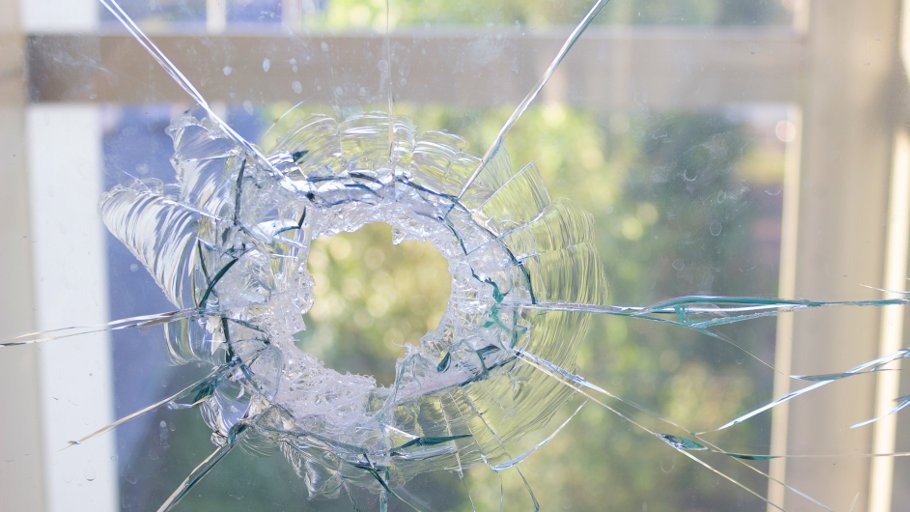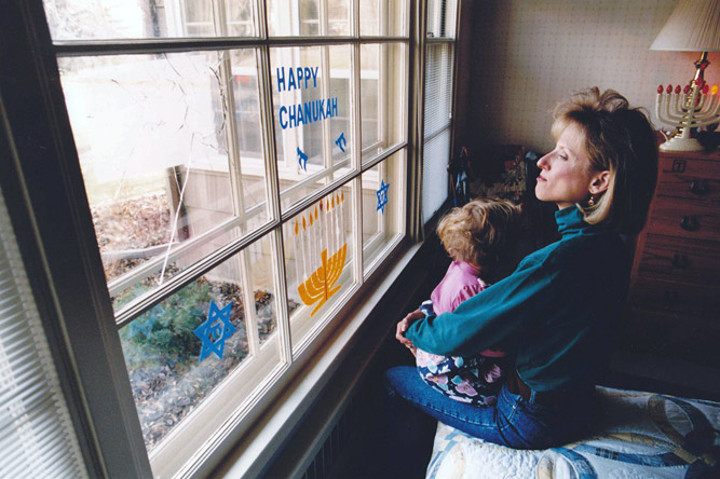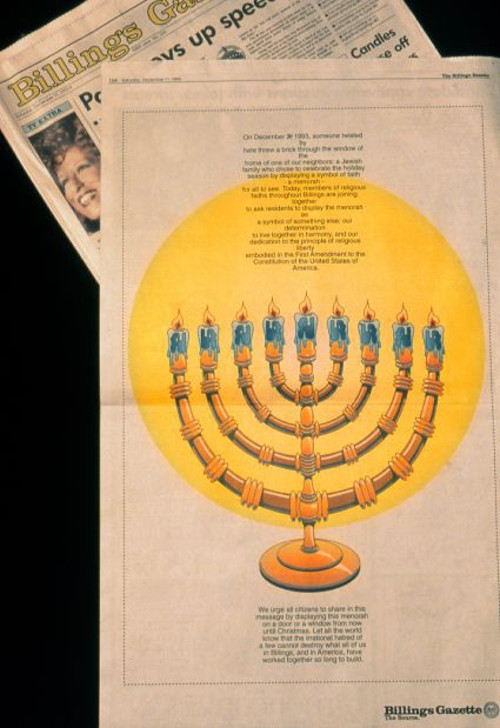 Iran’s Attack on Israel
Iran’s Attack on Israel


6 min read
The Schnitzer family had no idea that their children’s Hanukkah pictures would spark an anti-Semitic attack and galvanize a whole community.
In 1993, Brian and Tammy Schnitzer displayed their kids’ cheerful Hanukkah decorations on their bedroom window.
“I was downstairs working at my desk and the kids were downstairs too with a babysitter,” Dr. Brian Schnitzer said in an Aish.com exclusive interview. “I heard a noise so I went upstairs.” When Dr. Schnitzer reached the landing, he felt a cold breeze coming from his children’s bedroom. Their window was broken; a large chunk of concrete and shattered glass were on the floor.
He went outside to investigate and realized that someone had taken a paving stone from in front of their house and hurled it through the window decorated for Hanukkah.
Brian had grown accustomed to receiving racist phone messages and obscene letters. But this was different.
It wasn’t the first time the Schnitzers and others in their town of Billings, Montana, experienced acts of hate. Dr. Schnitzer was then serving as the head of the Montana Association of Jewish Communities and he’d grown accustomed to receiving racist phone messages and obscene letters. “They would tell me they wished I was dead.” Their local synagogue regularly received hate mail and messages too.
Various white-Supremacist movements operated in Montana at the time, and earlier that year Billings had seen a rash of hate crimes, though the term “hate crime” itself was new and many were dismissed as mere vandalism. In March, a gang of youths – including at least one skinhead – beat up a Billings teenager with a baseball bat while they screamed racial slurs. In October, a Native American family had their house spray-painted with obscene racist graffiti.
Hate crimes targeted the Jewish community in particular. Someone made a bomb threat against the Schnitzer’s synagogue just before a children’s Yom Kippur service. Then the Jewish cemetery behind the synagogue was desecrated and tombstones knocked over. That autumn, a beer bottle was thrown though the door of Uri Barnea, then the conductor of the Billings Symphony Orchestra and today a local rabbi.

But hurling a heavy stone through the Schnitzer’s window directly targeted Jewish children and put them in danger. “Before that, we felt that our homes and our families were inviolate,” Brian Schnitzer said. He and his wife Tammy were terrified. They told their kids Isaac (5) and Rachel (2) not to sleep in their bedroom. They were going to camp out in mommy and daddy’s room.
“I felt that if I couldn’t protect them, then the community had to,” Dr. Schnitzler explained. When the couple called the police, local officers insisted it was merely a case of vandalism and suggested the family put bars on their windows and get a guard dog.
Brian and Tammy were frustrated. “Somehow bars on windows and a dog barking in the yard isn’t what you want to tell your kids.” The couple decided to make sure the wider community knew what had happened instead.
The Schnitzers’ neighbor was very active in politics and he was due to host Sen. Conrad Burns, who was announcing his bid for reelection. Sen. Bob Dole of Kansas was scheduled to attend and lend his support. Dr. Schnitzer phoned Sen. Burns’ office and told a staff member that he thought it would be a shame if the Senator were to be at the neighbors’ brunch and say nothing about the anti-Semitic attack right next door. Within hours, a staff member called back, asking if the Senator could visit the Schnitzers when he was the area.
A few days after the attack, Senators Burns and Dole visited the Schnitzers, inspecting the damage and talking with the family, helping alert Billings residents about what had happened. Many locals felt terrible about the attack. One of Isaac Schnitzer’s friends gave him a picture of a menorah that she drew, with a note on the back saying how sorry she was. The Schnitzers and other local parents encouraged children to learn about tolerance.
Though the local Jewish population was only about 150, it was estimated that 10,000 menorah’s decorated Billings’ homes and other buildings.
A few days later, a local church had children draw pictures illustrating all sorts of winter holidays, including Hanukkah and Kwanzaa. Children drew pictures of menorahs and some brought them home and displayed their artwork in their windows. Dr. Schnitzer and other parents encouraged others to do the same. Some people drew their own menorahs, and soon people were distributing pictures to others. A local dry cleaner helped spread the trend by stocking pictures of menorahs for customers to take home.
Then the Billings Gazette got in on the act. David Crisp, the regional editor, asked his publisher for permission to include a full-page color picture of a menorah in the paper. The Saturday after the attack, the newspaper distributed thousands of menorah pictures as a centerfold. Soon, Billings was full of menorah pictures. Though the local Jewish population was only about 150, it was estimated that 10,000 menorah’s decorated Billings’ homes and other buildings.
 Full page menorah in Billings Gazette
Full page menorah in Billings Gazette
Anti-Semites targeted some of the displays. “The Catholic high school put something up on their marquee – and someone put a bullet through it,” Dr. Schnitzler recalls. “A church put a picture of a menorah on their window and someone threw a rock through it. People were putting it in their car windshields and getting them smashed.”
Despite the danger, thousands of Billings residents persisted, keeping their menorah decorations up throughout December. Rick Smith, a store manager, posted a sign in his store, Universal Athletics, that read: “Not in Our Town! No Hate. No violence. Peace on Earth.”
Dr. Schnitzer says he learned a valuable lesson. “You know how they say all politics is local? Well, all response is local. If people are hoping that someone is going to come out of the woodwork from far away and resolve problems for us, they won’t.”
Dr. Schnitzer is unsure if people would be able to come together like that again. All the different groups and community organizations decided to ignore their differences and focus only on what united them: combating anti-Semitism. “We had Democrats and Republicans and national officials and local officials and Catholics and Protestants and Jews… It was quite remarkable.” He feels the atmosphere in the U.S. today – even after the murder of 11 Jews in Pittsburgh – might be too extreme to allow that type of cooperation.
He also notes that virulent anti-Semitism is once again being voiced in Montana. In 2017, neo-Nazis in the town of Whitefish, Montana, even called for a march against Jews in the town. (The march never took place and local anti-racist campaigners protested instead.) Anti-Semitism is still a threat in some pockets of the state.
